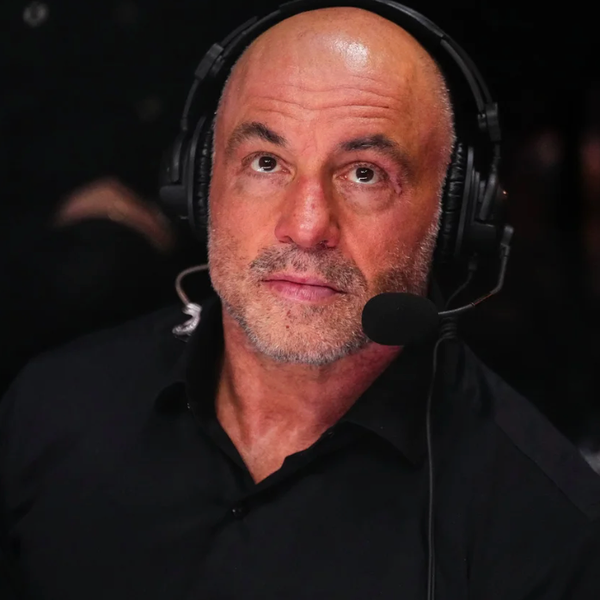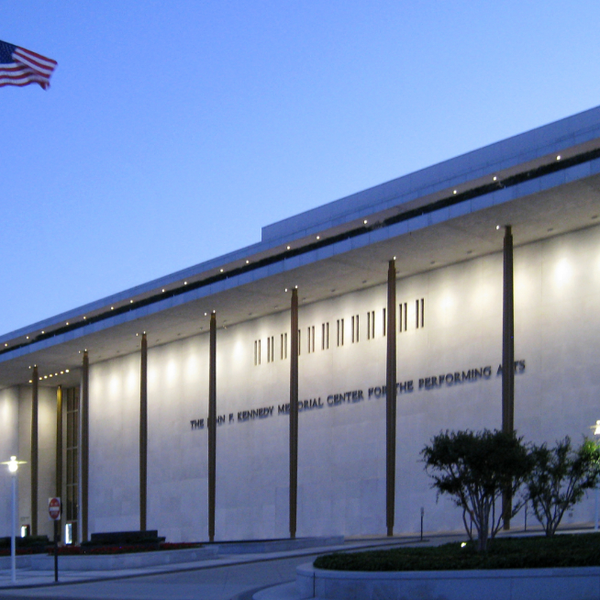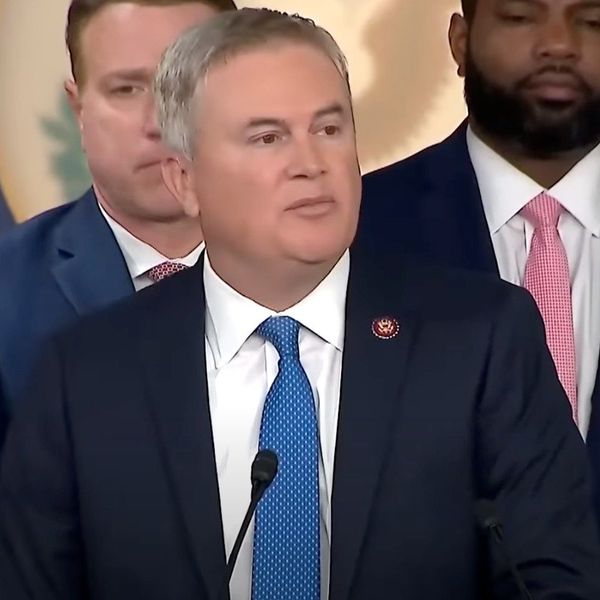
Reprinted with permission from ProPublica.
by Isaac Arnsdorf
When Donald Trump Jr., his brother-in-law and his father’s campaign chairman sat down with a Russian lawyer last June expecting to receive incriminating information about Hillary Clinton, the lawyer brought along a chatty Russian-born Washington lobbyist named Rinat Akhmetshin.
Akhmetshin’s presence at the meeting, reported today by the Associated Press, only deepens the mystery surrounding that encounter.
Like Natalia Veselnitskaya, the Kremlin-linked lawyer who showed up at the Trump Tower meeting, Akhmetshin is a colorful character, with a murky personal history and myriad ties to powerful Russian political and business leaders.
When I interviewed Akhmetshin last year, he told me he had served in military intelligence after being drafted as a young man growing up in the former Soviet Union. But he cut a figure unlike any Cold War thriller: a squat man in his late 40s with upright coils of graying hair, he arrived on a bright orange bicycle, wearing trendy glasses, a cardigan sweater and purple loafers. American officials quoted by NBC News said Akhmetshin was a military counterintelligence officer, and may still have links with Russian spy agencies, an assertion he adamantly denied to both NBC and the AP.
This much is clear: Since immigrating to the United States in the 1990s and becoming a dual citizen, Akhmetshin has worked as a lobbyist and public affairs consultant in Washington. Last year, he joined Veselnitskaya in a fight to overturn an American law that imposes financial and travel sanctions against Russians accused of violating human rights.
He is one of a growing number of figures with mysterious links to Russian government and business leaders whose names have surfaced in the sprawling investigations of Russia’s role in the 2016 election.
“In Russia, everything is much more informal, that’s what makes it so hard to pin down,” said Bill Browder, the investor who championed the U.S. law Akhmetshin and Veselnitskaya were attacking. “None of these people are carrying KGB business cards.”
Akhmetshin did not return a phone call or email from ProPublica. He told the AP he was surprised by how much attention his meeting with Trump Jr. has attracted. “I never thought this would be such a big deal,” he said.
Akhmetshin immigrated to the U.S. and runs PR campaigns for Kremlin causes.
As a lobbyist and public affairs consultant, Akhmetshin has worked for clients such as former Kazakh Prime Minister Akezhan Kazhegeldin, who fled his country on corruption charges that he said were politically motivated, and Andrey Vavilov, a powerful Russian politician and businessman who wanted to derail a rival’s bid for asylum in the United States.
A Dutch mining company owned by three Central Asian businessmen sued Akhmetshin in state court in Manhattan, accusing him of hacking into its computer system on behalf of a Russian firm with which it had a legal dispute. It quoted emails in which Akhmetshin purportedly told the Russian company that “the indexing is done” and that he would “get that thing in London tomorrow, can take it anywhere, pls advise where I should go.” Akhmetshin denied hacking or stealing any files. The dispute between the companies was settled with the Dutch firm which dropped its lawsuit against Akhmetshin.
In an affidavit filed as part of that case, Akhmetshin recounted a multi-faceted relationship with the American government. He said he had negotiated the lease of an U.S. air base in Kyrgyzstan, a former Soviet Republic that is now an independent nation. Separately, he said he had “helped save American lives” in Afghanistan by consulting with U.S. officials on “surveillance of undercover agents and suspected undercover agents.”
Akhmetshin has long cultivated relationships with journalists and government officials in Washington. I know of other reporters who have met with him for years and considered him a useful if mysterious source. He also introduced me to someone he claimed was a State Department official formerly posted in Moscow, but neither he nor the purported official would tell me his name.
Akhmetshin worked with Veselnitskaya on a top Putin priority: Undoing a U.S. sanctions law that has made it impossible for some prominent Russians to travel to this country.
When The New York Times first reported on Trump Jr.’s meeting with Veselnitskaya, Trump said it was to discuss resuming adoptions from Russia. In 2012, Russian President Vladimir Putin halted U.S. adoptions of Russian children in retaliation for passage of the Magnitsky Act, a U.S. law that froze the assets and restricted the travel of Russian officials accused of corruption and human rights abuses. The law was named after Sergei Magnitsky, a Russian lawyer who died mysteriously in a Moscow jail cell after investigating a $230 million tax fraud.
U.S. prosecutors in the Southern District of New York subsequently charged that almost $2 million from the tax scheme was invested in New York real estate. The holding company that bought the property, Prevezon, was owned by Denis Katsyv, the son of a man who was Moscow’s regional transport minister and is now vice president of state-owned Russian Railways. In May 2017, Prevezon settled the case by paying a $6 million fine in a deal in which it did not admit wrongdoing.
When the case was still pending, Katsyv hired both Veselnitskaya and Akhmetshin to represent his interests. Veselnitskaya had previously been the family’s go-to lawyer, The New York Times reported. She identified herself as the younger Katsyv’s lawyer in an affidavit filed in the Prevezon case.
Meanwhile, Akhmetshin registered as a lobbyist for a nonprofit organization called the Human Rights Accountability Global Initiative Foundation. Federal disclosures filed by the foundation show the organization was controlled by Katsyv and two other Russians.
Veselnitskaya and Akhmetshin both appeared at a planned screening in Brussels of a new documentary challenging the widely accepted narrative of the Magnitsky story. Akhmetshin also helped organize a screening in Washington on June 13 — a few days after he and Veselnitskaya met with Trump Jr. in New York. Campaign chief Paul Manafort and adviser Jared Kushner also attended.
Akhmetshin’s lobbying effort against the Magnitsky Act enlisted a former Democratic congressman from California named Ron Dellums, a former Treasury official, and several others, according to my reporting at Politico. I met Akhmetshin a few times last year in response to my questions on this subject. The lobbying succeeded in persuading Rep. Dana Rohrabacher, R-Calif., widely viewed as the member of Congress most sympathetic to Putin, into entering testimony from the director of the skeptical documentary into the congressional record, a propaganda coup for Moscow.
Akhmetshin has met Rohrabacher and one of his top aides repeatedly, people with direct knowledge of the meetings told me — they even had dinner at the Capitol Hill Club after a congressional hearing on U.S.-Russian relations.
The FBI warned Rohrabacher in 2012 that Russian spies were trying to recruit him, according to The New York Times. (That story did not mention Akhmetshin.)
Senate Judiciary Committee Chairman Chuck Grassley is investigating Akhmetshin’s lobbying.
Akhmetshin’s lobbying campaign has drawn the attention of Sen. Chuck Grassley, R-Iowa, who chairs the powerful Judiciary Committee. Grassley has been pressuring the Justice Department for answers about whether some people working with Akhmetshin failed to properly report their activities to the Justice Department. Grassley has also asked the Department of Homeland Security for information about Akhmetshin’s immigration record.
While Veselnitskaya was Katsyv’s Russian lawyer, Katsyv was represented in New York by Mark Cymrot of the law firm BakerHostetler. Cymrot hired a research firm called Fusion GPS, led by a former Wall Street Journal reporter named Glenn Simpson. Simpson and Akhmetshin were in contact and have known each other for a long time, people with direct knowledge of the relationship told me.
Browder, the investor who employed Magnitsky at the time of his death, accused Simpson of failing to disclose his participation in the lobbying effort. Fusion GPS said in a statement it didn’t lobby and didn’t do anything that required disclosure. Grassley invited both Browder and Simpson to testify at a hearing on foreign lobbying next week, but Simpson reportedly won’t show.
Simpson’s role is intriguing because last summer he was also working with Christopher Steele, the former British spy who was assembling research on Trump’s ties to Russia, later published by BuzzFeed. Fusion GPS has refused to reveal its client for that investigation.
The role of Fusion GPS in the 2016 campaign appears complex, to say the least. In the same year, the company has acknowledged working on a project supported by the Kremlin (the repeal of the Magnitsky Act) and hostile to Russia’s interests (the Steele dossier). The company said through its lawyer that it would have no comment.
Grassley has said Simpson’s ties to Akhmetshin undermine the Steele dossier’s credibility. U.S. officials have verified some parts of Steele’s research and valued his work in the past, according to CNN and The Washington Post. A person close to Steele said he had no knowledge of Simpson’s relationship with Akhmetshin and that Akhmetshin was not among the Russians who provided information to Steele for the dossier.
Akhmetshin’s history resembles that of several other mysterious figures in the Trump-Russia scandal.
Akhmetshin is not the only person with mysterious ties to Russian business and politics who have shown up in Trump’s orbit.
Konstantin Kilimnik: Manafort, who worked for the pro-Russian party in Ukraine before running Trump’s campaign, had an employee in Kiev named Konstantin Kilimnik who U.S. and Ukrainian authorities have suspected of having ties to Russian intelligence, according to Politico. Kilimnik served in the Russian army and learned English at a school that experts say often trains spies. Kilimnik denied being a spy to The Washington Post. Manafort had dinner with Kilimnik last August in New York, just before he was forced out of the Trump campaign amid growing questions about his work in the Ukraine, the Post reported.
Felix Sater: Years ago, Trump partnered on a Manhattan real-estate project with a convicted Russian criminal named Felix Sater. This February, Sater worked with then-national security adviser Michael Flynn on a back-channel peace plan for Russia and Ukraine, The New York Times reported.
David Zaikin: Until Trump picked Flynn for national security adviser, Flynn was lobbying for Turkish interests, although he didn’t initially disclose that. Since at least 2015, pro-Turkish lobbying in Washington was secretly coordinated by a Ukrainian-born man named Dmitri “David” Zaikin, people with direct knowledge of the arrangements say. Zaikin has denied any role in Flynn’s Turkish lobbying. A Canadian citizen who now lives in London, Zaikin brokered the sale of condos in the Trump Tower in Toronto, helped a Putin ally attract U.S. and British investors in western Siberia, and worked as an executive at a mining company owned by a Russian oligarch. In recent years, he has also become involved in international politics, advising parties in Albania and Macedonia.
ProPublica is a Pulitzer Prize-winning investigative newsroom. Sign up for their newsletter.








